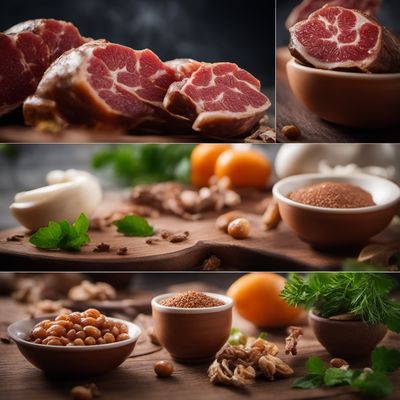
Ingredient
Animal carcase
The Essence of Animal Carcase
Animal carcase, also known as meat, is the edible flesh of animals that is widely used in cooking due to its versatility and ability to add depth and complexity to dishes. It comes in various cuts and forms, offering a wide range of textures and flavors.
Origins and history
The consumption of animal carcase dates back to prehistoric times when early humans discovered the benefits of hunting and cooking meat. Throughout history, different cultures have developed unique techniques and traditions for preparing and consuming animal carcase, making it an integral part of their culinary heritage. From the succulent roasts of Europe to the flavorful curries of Asia, animal carcase has played a significant role in shaping diverse cuisines around the world.
Nutritional information
Animal carcase is a valuable source of essential nutrients, including high-quality proteins, vitamins (such as B vitamins), minerals (such as iron and zinc), and healthy fats. Its nutritional composition varies depending on the type of animal and cut of meat, but it generally provides a good balance of macronutrients necessary for a healthy diet.
Allergens
Some individuals may have allergies or sensitivities to specific types of animal carcase, such as beef, pork, or poultry. It is important to be aware of these allergens and avoid consumption if necessary.
How to select
When selecting animal carcase, look for cuts that are fresh, firm, and have a vibrant color. Avoid meat that appears discolored, has a strong odor, or feels slimy to the touch. Additionally, choose cuts with a good marbling of fat for enhanced flavor and tenderness.
Storage recommendations
To maintain the freshness and quality of animal carcase, it is essential to store it properly. Raw meat should be stored in the refrigerator at temperatures below 40°F (4°C) to prevent bacterial growth. Cooked meat should be refrigerated within two hours of cooking and consumed within a few days. Freezing is also an effective method for long-term storage, but it is important to wrap the meat tightly to prevent freezer burn.
How to produce
Producing animal carcase requires specialized knowledge and facilities, making it more suitable for professional farmers and butchers. However, individuals can raise small animals like chickens or rabbits in their backyard with proper guidance and resources.
Preparation tips
Animal carcase can be prepared using various cooking techniques, including grilling, roasting, braising, stewing, and frying. It is important to cook meat to the appropriate internal temperature to ensure food safety. Additionally, marinating can enhance the flavor and tenderness of certain cuts. Experiment with different seasonings, herbs, and spices to create unique flavor profiles.
Culinary uses
Animal carcase is widely used in countless culinary applications, ranging from classic dishes like steak, roast chicken, and pork chops to international favorites like stir-fries, curries, stews, and barbecues. It is a versatile ingredient that can be the star of the dish or used as a supporting element to enhance other flavors.
Availability
Animal carcase is available in most regions and countries around the world, as it is a staple ingredient in many cuisines. However, the availability of specific cuts or types of meat may vary depending on cultural preferences and local farming practices.
More ingredients from this category » Browse all

Deer carcase
Venison: The Wild Delicacy

Sheep carcase
The Art of Lamb: Exploring the Versatility of Sheep Carcass

Ratites carcase
The Exotic Delicacy: Ratites Carcase Unveiled

Goat carcase
The Wholesome Base

Turkey carcase
The Versatile Turkey Carcase

Wild boar carcase
Untamed Bounty: Wild Boar

Goose carcase
The Flavorful Foundation

Horse carcase
The Noble Beast: Horse Meat

Pig carcase
Pig Carcase: A Versatile Ingredient

Bovine carcase
The Foundation of Flavor

Asses-mules-hinnies carcase
The Forgotten Meat

Rabbit carcase
The Art of Rabbit: Unlocking the Culinary Potential of Rabbit Carcass